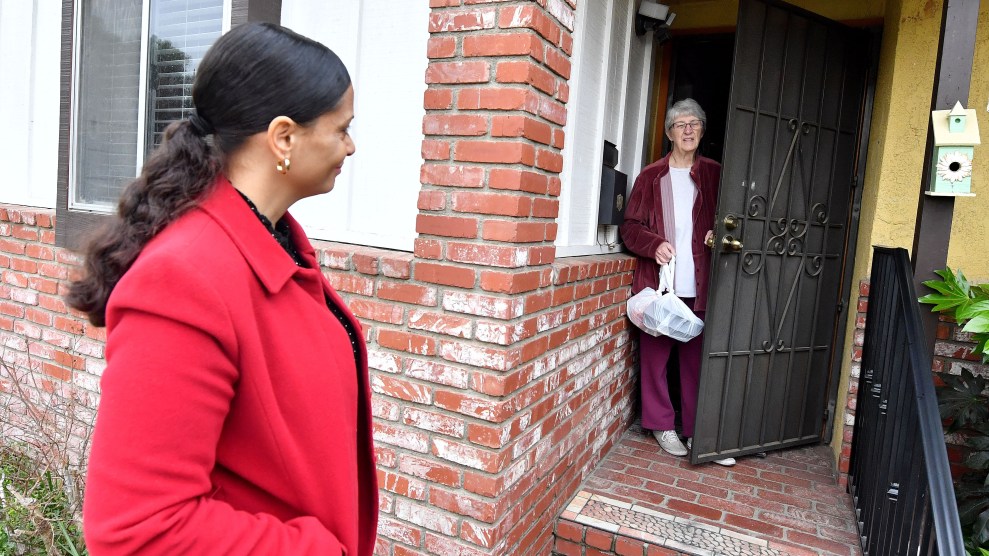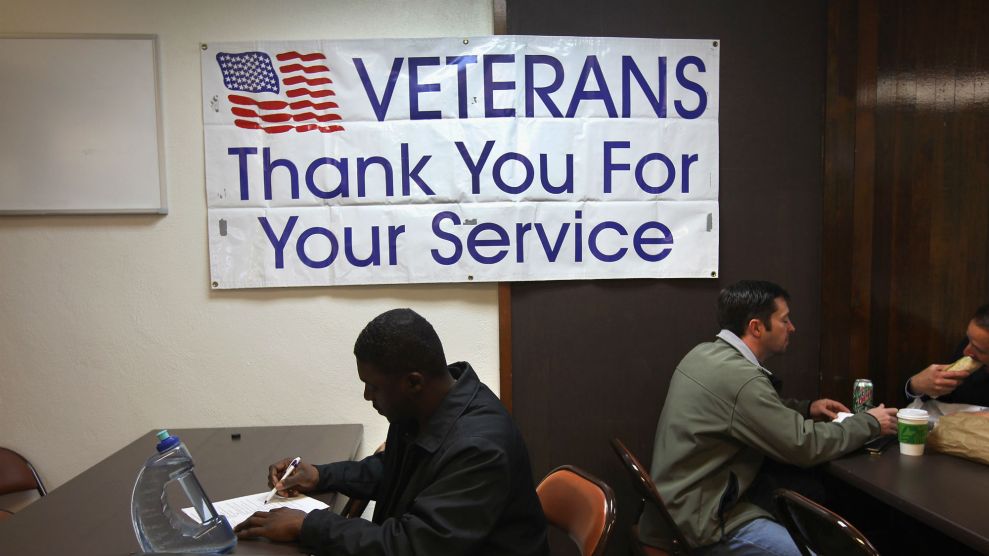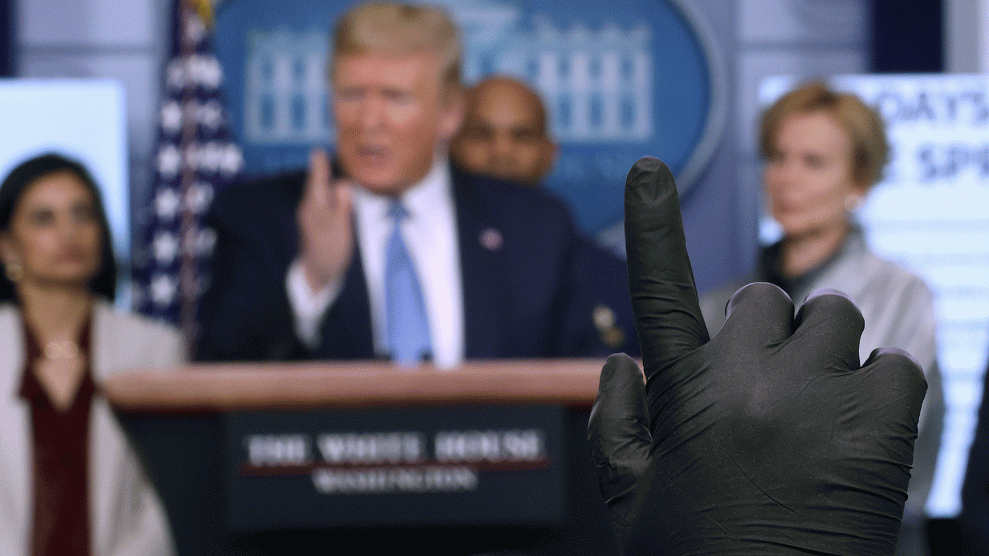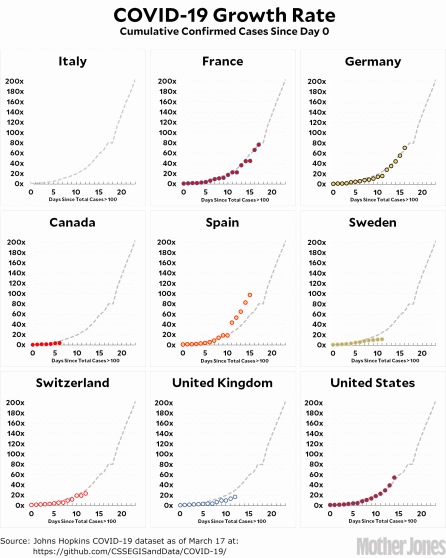
Riverside, California: Meals on Wheels volunteer Anny Delance (left) practices social distancing after delivering a lunch to Riverside resident Paula Carns, 79, Wednesday morning.Will Lester/Orange County Register/ZUMA
The coronavirus pandemic is causing massive social upheaval: school closures, health scares, and widespread lockdowns. But in the face of the real threat of system breakdown, communities across the country are banding together, stepping up to volunteer, organize, and strategize how to immediately help those who need it most.
So we asked Mother Jones readers and listeners: How are you helping others during the coronavirus crisis? We heard from people who are livestreaming storytime; helping local musicians by hosting online gigs; organizing donations and grocery deliveries; scrambling to convert class materials into virtual teaching aids; and giving everyone a smile.
Here are some of their stories, which we have edited for length and clarity:
Donnie Adison is a 47-year-old e-commerce shopper at a grocery store chain in Macon, Georgia. She’s trying to stay calm and picking up extra shifts at the store. She’s also been shopping for family and friends who aren’t mobile right now.
“I’ve been picking up extra shifts. We need a lot of help—cleaning, stocking. I’m just really trying to stay positive and always give everybody a smile, because people are so harried right now. I worry every day about all the people I’m coming into contact with, but I’m just not at the point right now where I can afford not to go to work. I also have a friend who I recently was reconnected with who finally got clean from drugs. She has a five-month-old. She’s in an outpatient program. And she’s not mobile. She doesn’t have a car. So, I got a list together of things she needed: Pampers, and body wash, some glasses for her kitchen. I’m just really trying to be part of the group of people that helped during the crisis, and not harmed.”
One listener, who preferred to stay anonymous, works at the Marshall Steam Museum in Hockessin, Delaware. She’s decided to take their storytime program online. Normally this program costs money on-site, but they’re making it a free resource for the community:
“We’re going to read a book every morning and post a video of it. And then any accompanying crafts or activities, for parents and their children, they can use as well. Sort of providing this free resource to our community, hoping that it helps. Hopefully even though it’s a few minutes long it helps with boredom. And I think it’s important that we still connect with each other and find ways to do that. We’re just looking to provide something free for our community, and something that hopefully they find useful.”
Mary Weller, 31, and her partner are active in the local music scene in Portland, Oregon. Live shows are the lifeblood of their community, but they’re taking preemptive measures to limit social gatherings to keep people safe:
“We’re basically constantly going out to shows, either shows that we are involved in, or shows to support our friends. It’s a huge part of our life, and it has been basically completely shut down because of the coronavirus. And there are several different musicians who are working on ways to start live streaming their shows as a way to keep our community connected to each other and keep encouraging people to stay home and stay safe. One person in particular, an electronic musician, is streaming things over vernsw0rld, which is their Twitch page, and they are planning on doing a show series and trying to use their platform to let other people stream over it as well. So it can be a place where people can reliably come to listen to music and connect with each other and not feel so isolated.”
Andrea Gladson is a pilot for American Airlines living in Norco, California. She runs a local Facebook group called “News for Norco,” which she’s been using as a platform to help others in her community:
“I put a post up asking for seniors, what their needs might be and how we can help, and see if we can connect them with help. Put a post up asking families with small children how we might be able to help. For example, somebody might have size 2 diapers that are opened, or formula that they don’t use, and somebody else might be able to use that. Also put a post up about how we can support our small businesses. So one of the things I suggested is that we use a platform like Groupon to try to find opportunities to purchase in advance, and also go and use gift cards at our local restaurants are businesses. And brainstorming all the ways we can figure out how keep our small town alive and connected and not adversarial, because certainly with politics that’s happened a lot in the last couple of years.”
One caller, who wished to remain anonymous, works at Trader Joe’s. Grocery stores are on the frontlines of the public health crisis right now. She is trying to stay positive in the face of panic-shopping and interactions with potentially infected people all day:
“We are trying to keep our best faces on: the brave face, the happy face, just trying to keep everybody’s morale up. But it’s hard. It’s exhausting. I’ve worked three days, 5:00 a.m. to 1:00 p.m., Friday, Saturday, and [Monday]. I go back in and I do it again tomorrow. I’ve read what the coronaviruses do to your lungs, and I don’t want that irreparable damage. I don’t want the risk of dying from it. I don’t want my family to get it. But I still have to go to work and earn that paycheck, and make sure that the people of Los Angeles are fed. Right now we’re switching over to hourly detailed cleaning of all the cash registers and limiting how many customers are allowed to enter the stores to about 50 to 100. And it’s just a lot of cleaning.”
Marianne Love teaches fourth grade in Salt Lake City. She called into the Mother Jones Podcast the night before her classes went online.
“Today all of us went to school, six feet apart, and we figured out how we’re going to do this for our kids. And we made videos, and we figured out how to reach them in a world that is so uncertain. I don’t know how many times I’ve cried today…In this time of uncertainty, figuring out how to be close to each other is such a great thing. Right now I’m gonna put on some music, and maybe read and book or two, and then I’m going to go to sleep. Tomorrow I’m going onto Zoom to meet my students one-on-one. We’re going to figure out how to do this shit in this time of uncertainty.”
Ann Marie Carlton, 46, is an associate professor of chemistry at the University of California, Irvine. She says she’s working on a model that could help predict the spread of the disease and trying to make her chemistry classes distance-learning friendly.
“What me and my colleagues are working to do, frantically, is we want to continue instruction for our students. We’re all furiously translating our courses to online courses. And in chemistry, where there’s a lot of labs, this can be very much a challenge. Some of my colleagues are very creative and were using Google Forms to make these choose-your-own-adventure online modules. I actually built a simplified model using Google Trends and air quality data, and I think that I’m able to predict the spread of disease in places where there’s no tests at all. And I want to work on that, but I feel my primary responsibility is to train the next generation of scientific leaders. I’m torn behind wanting to work on that model and wanting to teach and inspire my students so they can make their own better models one day.”
You can hear more on this week’s episode of the Mother Jones Podcast:


















